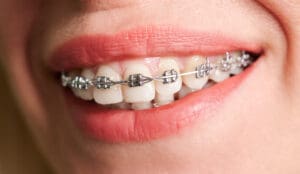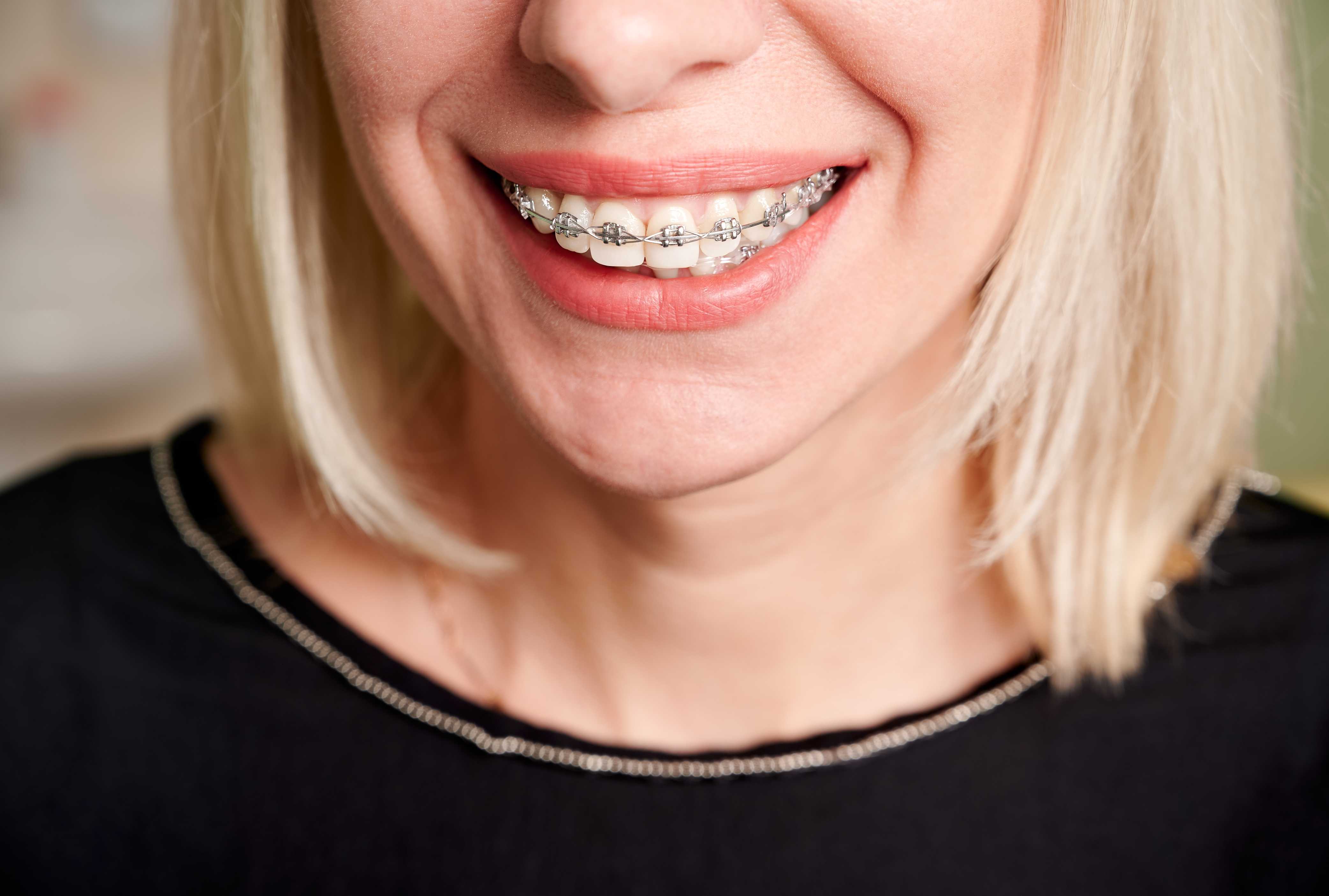 Thinking about getting a straighter smile? Traditional metal braces might be the best option for you. They’re a tried-and-true method for correcting a variety of dental issues, from overcrowded teeth to severe misalignment. If you’ve noticed problems with your bite or your dentist has recommended orthodontic treatment, metal braces could be the solution you need.
Thinking about getting a straighter smile? Traditional metal braces might be the best option for you. They’re a tried-and-true method for correcting a variety of dental issues, from overcrowded teeth to severe misalignment. If you’ve noticed problems with your bite or your dentist has recommended orthodontic treatment, metal braces could be the solution you need.
Traditional metal braces are known for their strength and effectiveness, making them a great choice for those needing significant dental adjustments. They work efficiently to move your teeth into the right position, giving you a healthier, more attractive smile.
If you’re wondering whether metal braces are the right choice for you, reach out to Smilebliss today to explore your options and get started on your journey to a better smile.
Gaps between teeth, or unwanted teeth spaces, are more than just cosmetic concerns. They can lead to serious dental health issues. Food particles and plaque find easy hideouts in these spaces, increasing the risk of tooth decay and gum disease.
Without treatment, these gaps can contribute to tooth wear. This is due to uneven pressure distribution when chewing. It makes maintaining oral health harder.
Traditional metal braces have proven effective in closing gaps between teeth. They offer a reliable solution for improving teeth alignment issues. Orthodontic visits help assess the necessity for brace placement.
Experienced dentists recommend them not only for their efficiency but also for the long-term benefits they bring to one’s oral health. By addressing these gaps early, individuals can avoid complex dental procedures like dental implants later on.
Closing gaps with traditional metal braces goes beyond improving one’s look. It significantly reduces the chances of developing dental health issues linked to untreated spaces between teeth.
Better alignment from braces means easier cleaning, leading to healthier gums and a reduced tooth decay risk. Ultimately, investing in correcting these gaps enhances the overall dental experience and self-confidence.
Crooked or crowded teeth can make proper brushing and flossing a challenge. This difficulty in maintaining oral hygiene often leads to plaque buildup. Plaque harbors harmful bacteria that can cause tooth decay and gum disease. When teeth are not aligned correctly, it’s harder to remove all the food particles and bacteria.
 Traditional metal braces are highly effective in straightening teeth. They work by gradually moving teeth into the correct position, improving both appearance and function. For many, full braces have become a necessary step towards healthier teeth.
Traditional metal braces are highly effective in straightening teeth. They work by gradually moving teeth into the correct position, improving both appearance and function. For many, full braces have become a necessary step towards healthier teeth.
Braces might also be a prerequisite for further dental treatments. For instance, before getting dental implants, your teeth need to be in the right alignment. This ensures the success of other treatments and the long-term health of your mouth.
An experienced dentist or orthodontist can identify orthodontic issues during a routine checkup. They look for signs of an overbite, underbite, or crossbite. These conditions often accompany crooked teeth and can exacerbate oral health problems.
It’s crucial to address these orthodontic problems early on. Delaying treatment can lead to more complex issues with adult teeth. Permanent teeth set in their ways are harder to straighten without orthodontics.
Severe overbites go beyond cosmetic concerns, posing real threats to oral health. Without correction, they can lead to tooth loss and decay. Traditional metal braces are often the solution. They realign teeth, preventing future complications.
Overbites force the lower front teeth to rub against the backside of the upper front teeth. This friction can cause significant wear over time. It may result in the need for extensive dental work.
Crossbites aren’t just alignment issues; they’re a pathway to more serious conditions. If left untreated, a crossbite can lead to asymmetric jaw growth and TMJ disorder. These conditions might require surgery.
A crossbite puts uneven pressure on one side of the jaw. This imbalance can cause pain and discomfort. It also makes chewing difficult, leading to nutritional problems.
Underbites present unique challenges, including difficulties in chewing and speech changes. They can alter one’s appearance, impacting one’s self-esteem. Moreover, underbites can cause symptoms of premature aging.
The strain an underbite places on facial muscles can lead to chronic jaw pain. It also increases the risk of tooth wear and TMJ disorder. Braces play a crucial role in correcting underbites, improving both health and aesthetics.
 Misaligned teeth can lead to speech problems. People often find it hard to pronounce certain sounds clearly. This issue stems from the teeth not aligning properly, which affects the way air flows through the mouth during speech.
Misaligned teeth can lead to speech problems. People often find it hard to pronounce certain sounds clearly. This issue stems from the teeth not aligning properly, which affects the way air flows through the mouth during speech.
Orthodontists assess these alignment issues. They can offer treatments like traditional metal braces to correct them. This step is crucial for improving speech clarity and, consequently, boosting self-esteem.
The impact of speech problems on self-esteem cannot be overstated. Patients struggling with unclear speech due to misaligned teeth might feel self-conscious. They may avoid speaking in public or social gatherings.
Correcting teeth alignment not only enhances oral function but also boosts confidence. It allows individuals to express themselves more freely and confidently. The benefits of this treatment extend beyond just a better appearance.
Orthodontic care plays an important role in addressing speech concerns. By treating the root cause, orthodontists help patients overcome complications related to misaligned teeth.
The improvements in speech following treatment are significant. Patients report feeling more at ease during conversations. They experience a notable boost in their self-esteem and overall quality of life.
Experiencing pain while chewing is often a sign of misaligned teeth. This discomfort can stem from the uneven pressure distributed across your teeth when they don’t fit together correctly.
Such pain should not be ignored. It signals that your oral health requires attention, possibly orthodontic treatment to rectify the alignment.
Ignoring chewing pain can lead to further oral health complications. Misalignment not only causes discomfort but can also result in additional stress and trauma to your jaw and teeth.
This can escalate into more severe issues over time, emphasizing the need for early intervention.
Traditional metal braces are a proven solution for correcting misalignment that causes chewing pain. They work by gradually moving your teeth into the correct position, thereby alleviating the pain associated with misalignment.
Opting for braces can significantly improve your quality of life, making eating a pain-free experience again.
If you’re noticing gaps between your teeth, crooked teeth, bite issues, speech problems, or experiencing pain while chewing, it’s high time to consider traditional metal braces. These signs aren’t just cosmetic concerns; they can lead to more serious health issues if left unaddressed.
Traditional metal braces have stood the test of time for good reason—they work efficiently to correct a wide range of orthodontic issues, ensuring not only a better-looking smile but also improved oral health.
Don’t wait for these problems to worsen. Seeking advice from Smilebliss can set you on the path to a healthier, more confident smile.
Remember, investing in your oral health is investing in your overall well-being. Schedule a consultation today and take the first step towards transforming your smile and boosting your confidence.
If you have gaps between teeth, crooked teeth, bite issues, speech problems, or experience chewing pain, these are strong indicators that traditional metal braces could be beneficial for your dental health.
Gaps can lead to dental health issues and affect your smile’s appearance. Braces effectively close these spaces, aligning your teeth for a healthier, more attractive smile.
Yes, braces are designed to straighten crooked teeth, improving both your oral health and the aesthetics of your smile.
Bite issues can cause uneven wear on teeth, jaw pain, and other dental problems. Braces correct these malocclusions, preventing further complications.
Misaligned teeth may contribute to speech difficulties. By correcting the alignment with braces, many patients see an improvement in their speech clarity.
Yes, chewing pain often indicates misalignment issues that braces can address, leading to a more comfortable and efficient bite.
While braces are commonly associated with teenagers, adults can also benefit significantly. It’s never too late to improve your dental health and aesthetics with braces.